- Home
- J. T. Edson
Waco 4 Page 4
Waco 4 Read online
Page 4
“No lousy owlhoot’s going to rob me,” Wilson repeated, not lowering his gun and not seeing the glint in Joey’s eyes.
“It’s your choice,” Waco replied. “Call it whichever way you want.”
For all his words Waco knew the danger he faced. The young outlaw might still be on his knees but he no longer made a sound. In a moment, unless disarmed, he would make a grab at the gun and try to kill his way out of the spot he found himself in.
Wilson hesitated, although the temptation to kill stayed with him, kicking at his nerves, begging him to make a move. Yet, for all that he held his hand, knowing the only way he could kill the outlaw would be to drop the young Texan first.
“You might get one of us, gambling man,” Cody Yarrow cut in, swinging his shotgun and cocking back the unfired barrel’s hammer. “But it’ll be hell trying to decide which one first.”
At that moment Joey saw his chance and took it. He knew all attention had been diverted from him and he would never have a better chance. His hand drove down, closed on the butt of the gun, and he dived to one side, fanning the hammer as he went. He did not know where the shots were going and cared less. He was scared, and like a rat in a trap attacked blindly, striking without worrying over whom he struck.
Three times the gun roared, the bullets lashing the air around Waco and narrowly missing the women. Then Waco turned and fired through the powder smoke that wrapped and wafted around Joey. The young outlaw reared up, the force of the .45 bullet almost lifting him to his feet-but he still held his gun. Waco acted like the trained lawman he was. Joey still held his gun, kept his feet, and was as dangerous as ever. The bandanna had slipped, showing his features, not much more than seventeen years old, or his face lied. Old or young, he could still squeeze a trigger or slap back the hammer. So Waco fired again, throwing his lead into Joey’s head and sending him down.
“No!” Bertha Ford screamed. “No!”
The outlaw’s body pitched over even as the words left her lips. She moved forward, by Waco, who stood with smoke dribbling up from the barrel of his Colt, and looked down at Joey. The outlaw lay spread-eagled on the ground, his face young looking and innocent now as death clouded and removed the killer glare in his eyes. For a moment Bertha Ford looked down at the outlaw then turned to Waco.
“Murderer!” she hissed.
If Waco heard, he gave no sign. He holstered his matched guns and turned to face Wilson as the gambler slid his Merwin & Hulbert back under his arm.
“You stupid, no-good skunk!” Waco said, his voice throbbing with anger.
“What’s wrong with you?” Wilson replied harshly. “He’s not the first you’ve had to cut down.”
Waco moved in. His right fist drove out to crash into the gambler’s face and sent him sprawling to the ground. Wilson lit down hard on his back, and his hand went under his arm. Cody Yarrow stepped forward, bringing down the shotgun to press on the gambler’s arm, holding the gun in its shoulder clip.
“Don’t make him kill you!” Yarrow snapped.
Working his fingers to get the stiffness out of them, Waco moved forward to stand over Wilson.
“That kid died through you and for no good reason,” he gritted. “You gave him time to get his nerve back. I could’ve taken him alive if you hadn’t.”
“So what?” Wilson spat out, getting to his feet. “He was on the prod, just looking for a chance to kill. You saw that yourself.”
Yarrow caught Waco by the arm and held him. “We’ve got to move the coach, amigo,” he said gently. “This is no place for the women.”
Slowly the anger left Waco. He looked to where Julie led Caroline to the coach. The driver and guard had climbed down and they helped Caroline inside, for the girl was close to hysteria. Bertha Ford followed, throwing a look as she entered the coach at the tall young Texan who had saved their lives.
Wilson turned and was about to go to the coach when Waco snapped: “Not you, hombre. These three have to be buried and you’re helping with it.”
For a moment it seemed Wilson would object. Then he saw the determined look on Waco’s face and the cold gleam in Cody Yarrow’s eyes. He knew they stood together and would make him wish he had obeyed without argument if he gave them trouble. The driver brought a pick and shovel from the coach’s trunk and with a contemptuous gesture tossed the shovel to Wilson.
“Dig or walk, it’s all one to me.”
Waco turned to the gaunt preacher. “You’d best come along, Reverend,” he said. “Say a few words over them.”
“I suppose even the ungodly such as these need that,” Hodges replied.
The bodies were carried into the bushes for burying while in the coach the women sat in silence for a time. Julie looked at Bertha Ford and asked: “Aren’t you going to say anything to your niece?”
“Let her cry it out,” Bertha replied, lips tight and grim. “I’ll say what I have to say in private.”
“She could use some comfort now,” Julie stated. “Easy now, honey. It’s all over and done with.”
Bertha looked at Julie and her lips tightened again, but she did not offer to speak either to her or to Caroline. Time passed and the men returned, the passengers climbing into the coach while the guard fastened three saddled horses to the rear. Then he took up his shotgun, checked the trunk fastenings, and climbed on top.
The coach lurched on its way again and for a time none of the passengers spoke. Suddenly Bertha Ford jerked erect in her seat, her forefinger pointing at Waco.
“You! I recognize you now. You’re the one I saw this morning coming into Albion. Driving three men before you just like they were animals.”
“Yes, ma’am,” agreed Waco, seeing a clash and not sidestepping it. “Just like that.”
“This here’s Waco, ma’am,” Cody Yarrow put in. “He’s an Arizona Ranger.”
The words were ill timed and did nothing to help the situation. The Arizona Rangers owed their existence to the Democratic governor of the territory and in Bertha Ford’s eyes that meant they were a political force, a private police with powers exceeding those of county sheriffs and even United States marshals.
“You drove those prisoners like cattle,” she went on savagely. “Then you killed that child back there. Shot him down without a chance.”
“Now hold hard there, ma’am,” Cody Yarrow growled. “Waco shot because he had to shoot. He cut that boy down, sure, but it was the boy or his own life.”
“Self-defense,” Mrs. Ford sneered. “The cry of the protected killer behind a law badge. Was he driving those three men for self-defense too?”
“Yes, ma’am, I was,” Waco replied. “Those three and two more raided a small-town bank. They lost their heads inside and shot down two fellers and an old woman. Shot them in self-defense, way you’re calling it, even though none of them three folks had a gun. Then they killed a deputy, a white-haired old-timer who held a star like he’d done for so many years he just couldn’t do no other work at all. He was one of those protected killers behind a law badge, likely. I was on hand, took after them, and they ran. They killed four hosses running from me and lost the fifth when I caught up with them. Those three I brought in were all that I could. They allowed to jump me as soon as I stopped to sleep and I allowed they wouldn’t. So we didn’t stop. Yeah, I reckon I drove them like cattle for self-defense.”
“You killed two men of the gang and two back there,” Bertha Ford gasped. “Four men in less than a week. What gives you that right? By what authority do you set up as judge, jury, and executioner?”
“I’m an Arizona Ranger, ma’am. I do things the way I have to.”
“The way you see fit to, you mean. Four men lie dead because you saw fit.”
“Yes, ma’am, and I’m still alive. Way I see it, my life’s valuable and any man who tries to kill me’s got to be stopped, even if I have to kill him. Why? No reason except that I’m important to me. I could have stood by and let those three back there rob us. Likely they’d done it and gone
without giving us trouble. But what about the next job they pulled, or the one after that? Someday they’d hit on a man who tried to fight back. They’d spook and throw lead wild, maybe kill some innocent gal or old man who happened to be nearby when the shooting started. Way I saw it, I was paid to take the chance. As long as I could do it without getting you folks hurt, I’d got to stop those three afore they killed me-or somebody else.”
“So you, with your God-given right, killed them,” she hissed. “One of them was a boy of not more than seventeen.”
“He’d got a gun, ma’am, and knew how to use it. That made him a man growed. At seventeen I held a law badge in Mulrooney and did a man’s work. In New Mexico right now, ma’am, there’s a boy of seventeen who’s killed at least eight men. His name’s Bill Bonney, you likely heard of him as Billy the Kid.”
“What of it?”
“You can’t tell me about killers no matter what age, ma’am,” Waco replied. “I’ve lived most all my growing years among men who’ve used guns and killed. That boy back there stood full growed with a gun in his hand. He wanted to shoot his way clear, to kill, and he wasn’t bothered which of us he killed. Me, you, the preacher, any of us, didn’t make no never mind as long as he killed. That kind has to be stopped fast, ma’am. He died there this afternoon, but likely other folks’ll live the safer for it.”
“Words!” the woman hissed back, not another of the passengers speaking as they watched Waco face her. “The same excuses I’ve heard from professional killers with badges given by Democratic power seekers—”
“Stop it!” Caroline screamed out the words, coming to her feet and facing her aunt. “Aunt Bertha, you’ve said and done enough. Must your hatred for the Democrats be brought into everything and against everybody you meet! You’ve ruined my life for years. Don’t try and ruin it anymore.”
Bertha turned amazed eyes to her niece. “Caroline,” she gasped. “How do you mean, ruined your life?”
“You have!” the girl replied. “What life have I ever had? Never allowed to mix with people of my own kind because their parents were Democrats. What kind of friends did I have? The college students you and your kind paid to educate. What sort of friends were they? Intelligent and nothing more, hating everyone who had anything they did not, despising the working-class people they came from. They were the worst snobs in the world, with nothing but intelligence that had no purpose except to ruin anyone better placed. They were the friends I had. That was why I came west with you. I wanted to meet people, decent, friendly people, not boorish intellectuals. So I came west with you and I wish to God I had not.”
For the first time in her life Bertha Ford felt uncomfortable as she tried and failed to meet her niece’s hate-filled eyes. “I—don’t understand you.”
“You don’t know, do you?” Caroline answered. “You’re so blindly egotistical you can’t see beyond your own nose. Look at me, Aunt Bertha. Look at me. I’m a good-looking woman, I’m young, I’m still not too old to be happy. Yet at the only dance we attended, at Fort Becket, the partners I had were ordered to dance with me by the commanding officer. I heard the other women laughing about it. They danced but they would not speak to me, and you know why. Because I’m Bertha Ford’s niece and anything they said might be twisted into lies and sent east to be published in some mud-slinging newspaper. It was the same everywhere I went. Nobody wanted to speak with Bertha Ford’s niece. I’ve not had a pleasant word spoken to me until we boarded this stage, and now you’ve spoiled that. These people know who I am. They know if they talk to me they might say the wrong thing. They know you’re waiting, like you waited with that half-breed interpreter for every unsupported Apache story, without checking the facts as long as they were derogatory to the army. And why, because the army serves the Democrats in your eyes. Not because they’re taking some lives, or because you really care what happens to the Apaches. I’m sick of lies and I’m more than sick of you!”
With that the girl turned, tears trickling down her cheeks. She felt two arms around her and heard Julie whispering to her to sit down. The full flood of her emotion burst like a flood. She sank to the seat by Julie and sobbed in the other woman’s arms.
Bertha Ford met the eyes of the men with what defiance she could manage. The gambler and the gaunt preacher displayed little interest but the other two showed their cold dislike, for both had been part of a force that felt the lash of her printed words. They knew who she was now and wondered what drove her to hunt out any kind of story as long as it was discreditable to the law officers or army.
“Well,” she hissed, “now you know who I am. Do you wish you’d let that boy kill me?”
“No, ma’am,” Waco replied. “I’d’ve stopped him even knowing who you are. It would’ve been my job. Why d’you hate us, ma’am? We’ve work to do, dirty work, and we play it the only way we can. Sure, there’s some who’d play dirty, come what may, I’m not denying it. I’ve known lawmen who’d cut down a man without asking two words, if they thought he needed taking in. Hickok was one and he was no Democrat. His sort don’t last long. Sooner or later the decent folk of that sort’s town want real law and they move him on. It happened to Hickok in Hays and Abilene. It’ll happen to the Earps in Tombstone in the end.”
“You work as a hired killer for the Democrat—”
“No, ma’am. Leastways, as far as I know, never having gotten round to asking him, Cap’n Mosehan’s a Republican. Me, I’m maybe a year too young to vote but I’ll like vote Democrat when I do. That won’t stop me respecting Cap’n Bert, taking his orders, and doing whatever I have to do no matter what party’s in at the territorial capital.”
“What makes you hate Democrats, ma’am?” Cody Yarrow asked. “I’ve seen some politicians from both sides, they allus seemed to get on friendly enough away from the voting floor.”
“Why do I hate them?” Bertha replied, her voice low and throbbing. “They killed my husband. A drunken mob of Democrats took my husband out and hung him from a tree. And you ask why I hate Democrats.”
With that she sank into her seat, face set and rigid, without a touch of color to it. The other passengers did not speak to each other, and apart from the ever-present sound of hooves, the creak of leather, and the groans of the timber of the coach, only Caroline’s sobs joined the clicking as Waco turned the cylinder of his Colt, ejecting the empty cases and replacing them with live bullets, for his task had not ended yet.
Outside, the sun sank slowly and in the distance the lights of Randle’s Way Station glowed invitingly.
Randle’s Way Station lay by the side of a fair-sized river, just where it formed a lake. The area looked like a green oasis after the harsh and arid land the coach traversed during the day. The way station, a long, cool-looking, and sizable building, was a haven of rest for travelers. To one side lay an adobe-walled corral where the spare teams and horses of visitors were kept. To the other side rose the jacales of some dozen or so workers of mixed Mexican-Apache blood. For some strange reason no lights showed from the jacales; they stayed silent and deserted as the coach came to a halt before the station building.
Ma Randle stepped from the open door of the building, a double-barrel ten-gauge in her hands. She looked toward the coach in a cautious manner, which did not leave until she recognized the driver.
“Howdy, Shotgun, Mick,” she greeted.
The driver looked around. There should have been a purposeful bustle about the place, peons running up to unhitch the team and help unload such luggage as the passengers needed for the night. Only there were no peons, nothing but Ma Randle with her shotgun and her wolf-cautious stare.
“Where’s Pedro and the boys, Ma?” asked the driver, who went by the name of Shotgun. “Or do we have to unhitch our own team now?”
“That’s just what you have to do,” she replied. Ma Randle stood six feet, a mountain of a woman with the heft and muscles of a hard-rock miner. Her hair was gray, her face tanned oak brown but still retaining something of bea
uty. The big body might bulk and strain inside the gingham dress but Ma had little surplus fat; it was hard firm flesh, and the arms rolled with such muscles as a strong man might not be ashamed to possess.
She ran the way station, aided by her tiny husband, although Ma did all the heavy toting around the place. From the look of her and her general attitude, the words had much truth in them. One thing nobody could say about Ma was that she did not know her work. The fact that no peons were on hand to help unhitch the team did not mean Ma was unaware they should be. She kept the station going and usually the peons hopped like fleas on a griddle to obey her orders.
“What’s wrong, Ma?” asked the driver, knowing her of old. “You got some trouble here?”
“Not yet. Get your folks out and into the house, then put those hosses in the corral. There’s plenty of room.”
Waco did not stand on ceremony and left the coach ahead of the women, with Cody Yarrow hard on his heels. Ma Randle looked them over and a flickering expression came to her face as she recognized them.
“Howdy, Ranger, Cody,” she greeted. “You’re as welcome as water in the desert. How many more inside?”
“Five, Ma,” Waco replied. “Something wrong?”
“Nothing much. ’Cepting that every head of hosses went last night and come dawn Pedro pulled out with the peons. Then when I thought to wire for the company to send a trouble-shooter along, I couldn’t get through; the wires were down. I sent Pa out to find the break in the line and he found it all right. Over a hundred foot of it cut and gone.”
“Which starts to sound like Apaches,” Waco drawled, then stopped speaking as the other passengers climbed from the coach. There was no sense in starting a panic since the station was in no immediate danger.

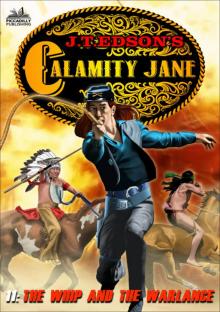 Calamity Jane 11
Calamity Jane 11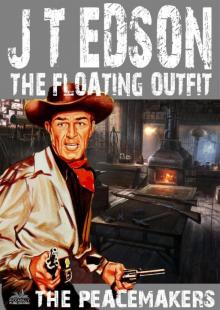 The Floating Outift 33
The Floating Outift 33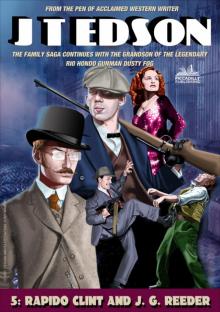 Cap Fog 5
Cap Fog 5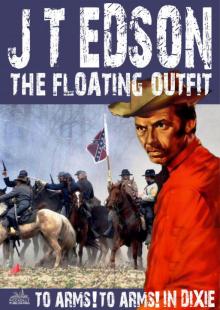 The Floating Outfit 34
The Floating Outfit 34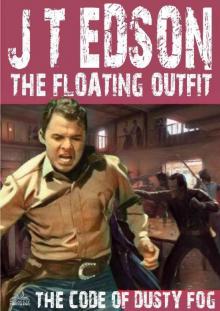 The Code of Dusty Fog
The Code of Dusty Fog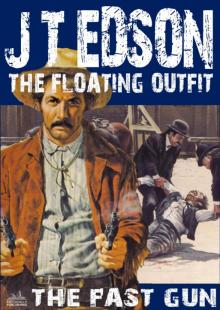 The Floating Outfit 21
The Floating Outfit 21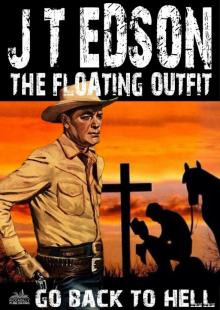 The Floating Outift 36
The Floating Outift 36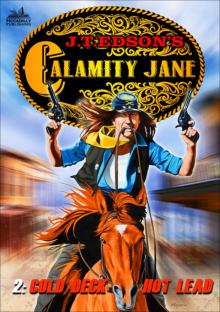 Calamity Jane 2
Calamity Jane 2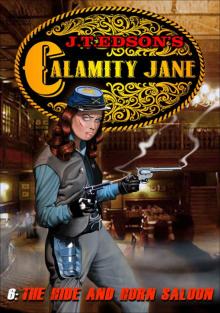 Calamity Jane 6: The Hide and Horn Saloon (A Calamity Jane Western)
Calamity Jane 6: The Hide and Horn Saloon (A Calamity Jane Western)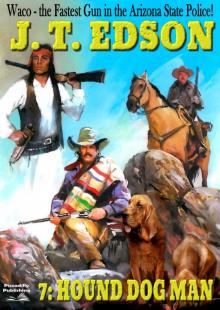 Waco 7
Waco 7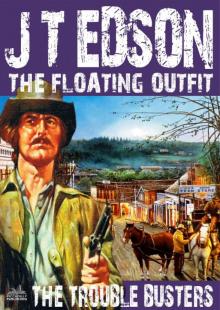 The Floating Outfit 25
The Floating Outfit 25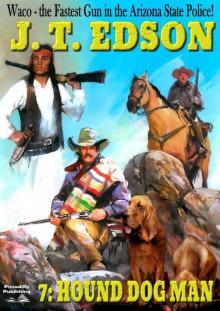 Waco 7: Hound Dog Man (A Waco Western)
Waco 7: Hound Dog Man (A Waco Western)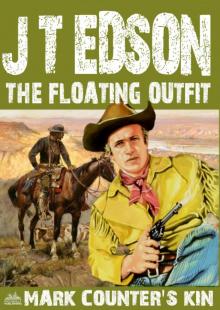 The Floating Outfit 47
The Floating Outfit 47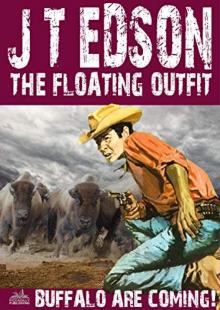 The Floating Outfit 42: Buffalo Are Coming!
The Floating Outfit 42: Buffalo Are Coming!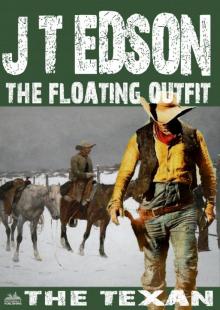 The Floating Outfit 46
The Floating Outfit 46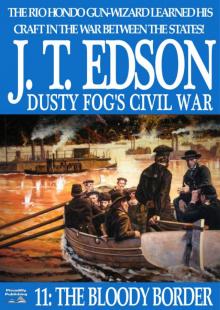 Dusty Fog's Civil War 11
Dusty Fog's Civil War 11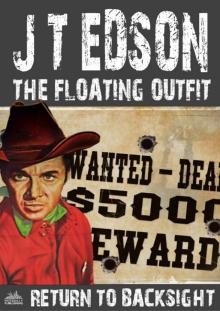 The Floating Outfit 61
The Floating Outfit 61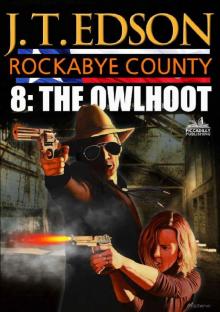 The Owlhoot
The Owlhoot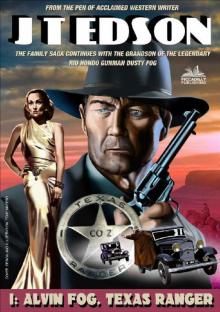 Alvin Fog, Texas Ranger
Alvin Fog, Texas Ranger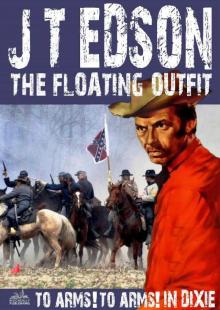 The Floating Outfit 34: To Arms! To Arms! In Dixie! (A Floating Outfit Western)
The Floating Outfit 34: To Arms! To Arms! In Dixie! (A Floating Outfit Western)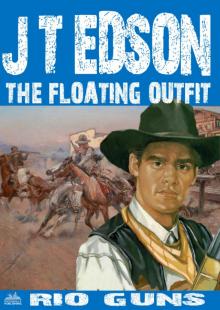 The Floating Outfit 44
The Floating Outfit 44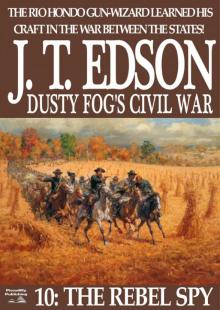 Dusty Fog's Civil War 10
Dusty Fog's Civil War 10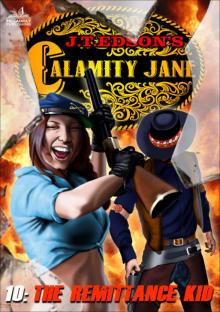 Calamity Jane 10
Calamity Jane 10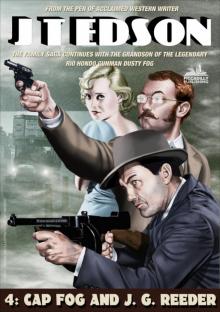 Cap Fog 4
Cap Fog 4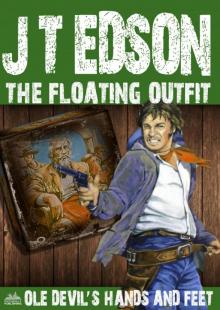 The Floating Outfit 51
The Floating Outfit 51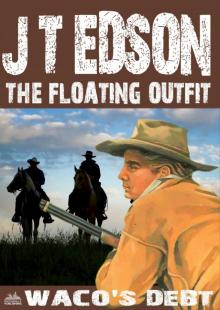 The Floating Outfit 50
The Floating Outfit 50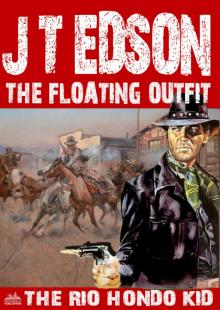 The Floating Outfit 49
The Floating Outfit 49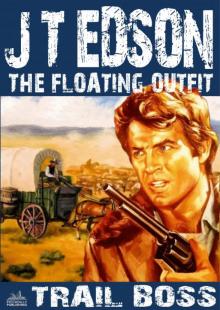 The Floating Outfit 10
The Floating Outfit 10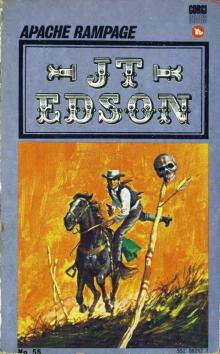 Apache Rampage
Apache Rampage The Floating Outfit 15
The Floating Outfit 15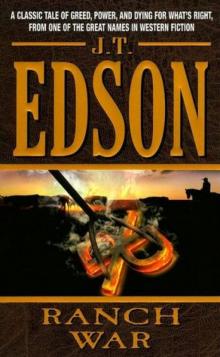 Ranch War
Ranch War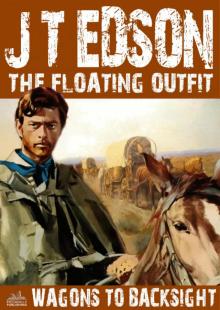 The Floating Outfit 11
The Floating Outfit 11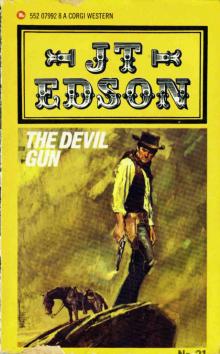 The Devil Gun
The Devil Gun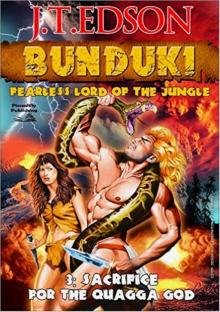 Sacrifice for the Quagga God (A Bunduki Jungle Adventure Book 3)
Sacrifice for the Quagga God (A Bunduki Jungle Adventure Book 3)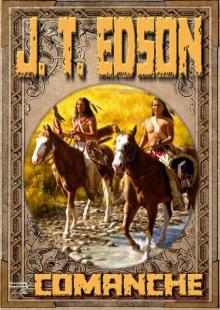 Comanche (A J.T. Edson Western Book 1)
Comanche (A J.T. Edson Western Book 1)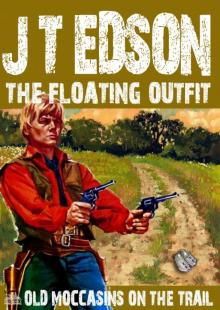 The Floating Outfit 48
The Floating Outfit 48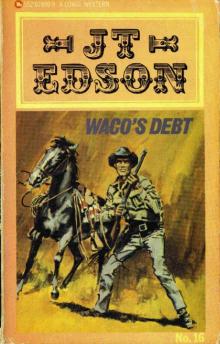 Wacos Debt
Wacos Debt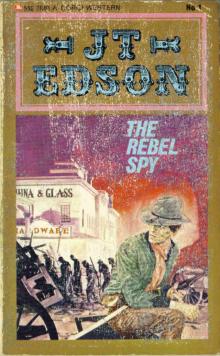 The Rebel Spy
The Rebel Spy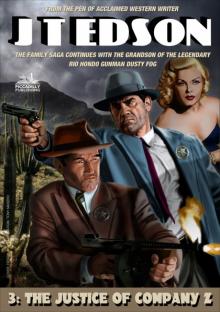 Cap Fog 3
Cap Fog 3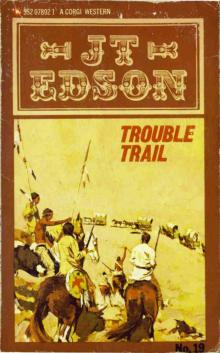 Trouble Trail
Trouble Trail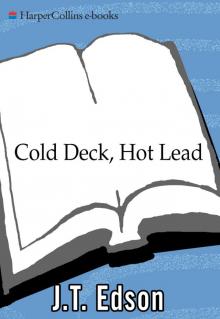 Cold Deck, Hot Lead
Cold Deck, Hot Lead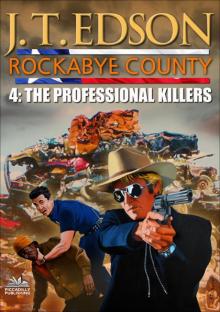 Rockabye County 4
Rockabye County 4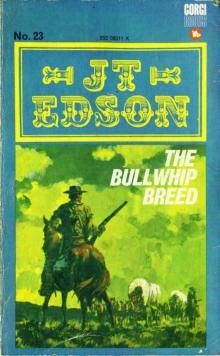 The Bullwhip Breed
The Bullwhip Breed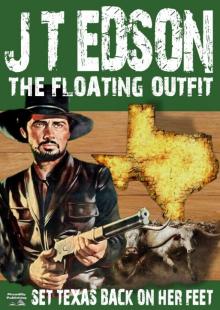 Set Texas Back On Her Feet (A Floating Outfit Western Book 6)
Set Texas Back On Her Feet (A Floating Outfit Western Book 6)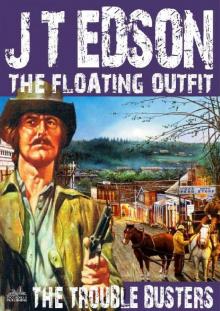 The Floating Outfit 25: The Trouble Busters (A Floating Outfit Western)
The Floating Outfit 25: The Trouble Busters (A Floating Outfit Western)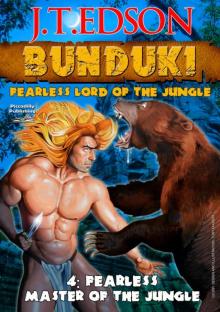 Fearless Master of the Jungle (A Bunduki Jungle Adventure
Fearless Master of the Jungle (A Bunduki Jungle Adventure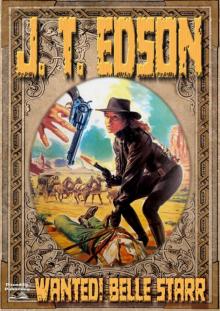 Wanted! Belle Starr!
Wanted! Belle Starr!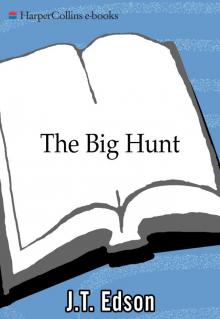 The Big Hunt
The Big Hunt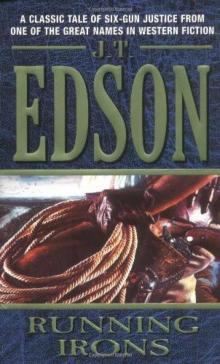 Running Irons
Running Irons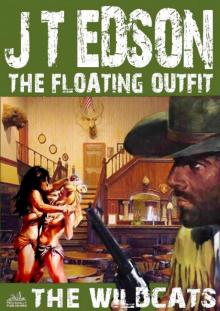 The Floating Outfit 19
The Floating Outfit 19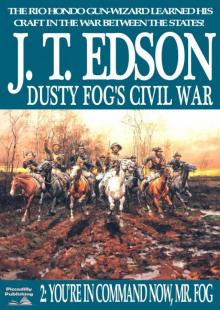 You're in Command Now, Mr Fog
You're in Command Now, Mr Fog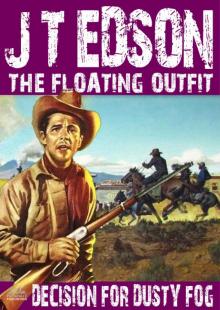 The Floating Outfit 27
The Floating Outfit 27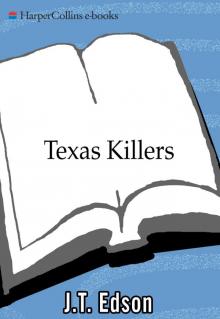 Texas Killers
Texas Killers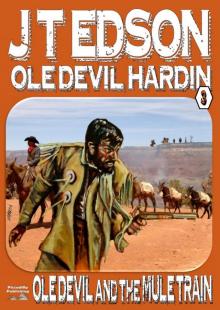 Ole Devil and the Mule Train (An Ole Devil Western Book 3)
Ole Devil and the Mule Train (An Ole Devil Western Book 3)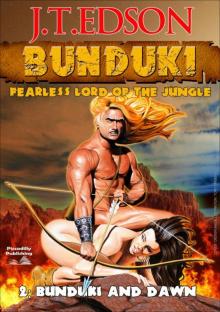 Bunduki and Dawn (A Bunduki Jungle Adventure Book 2)
Bunduki and Dawn (A Bunduki Jungle Adventure Book 2)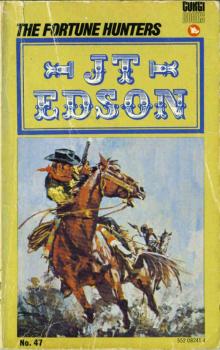 The Fortune Hunters
The Fortune Hunters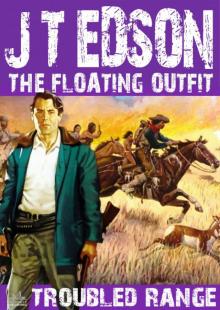 The Floating Outfit 12
The Floating Outfit 12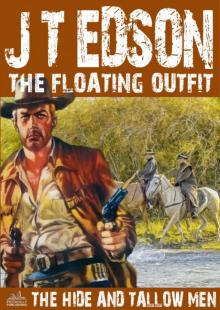 The Hide and Tallow Men (A Floating Outfit Western. Book 7)
The Hide and Tallow Men (A Floating Outfit Western. Book 7)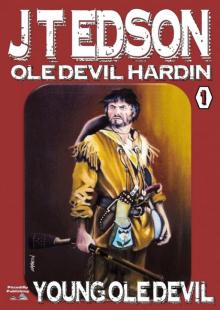 Young Ole Devil
Young Ole Devil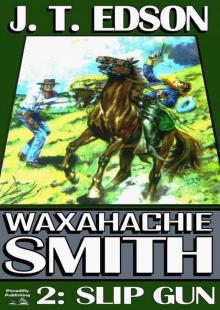 Slip Gun
Slip Gun The Drifter
The Drifter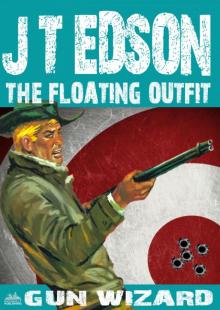 The Floating Outfit 45
The Floating Outfit 45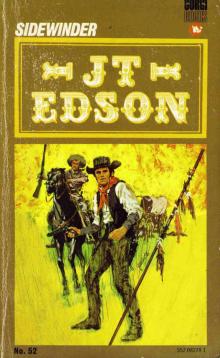 Sidewinder
Sidewinder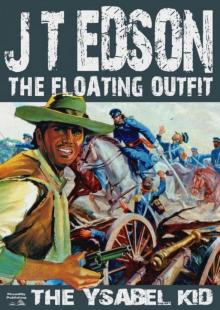 The Ysabel Kid
The Ysabel Kid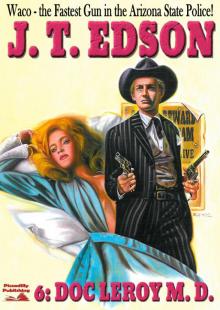 Waco 6
Waco 6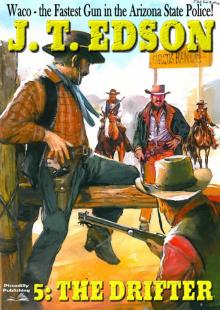 Waco 5
Waco 5 Point of Contact
Point of Contact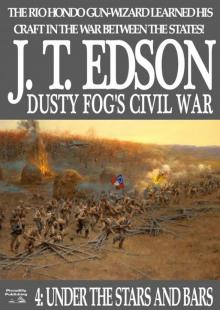 Under the Stars and Bars (A Dusty Fog Civil War Western Book 4)
Under the Stars and Bars (A Dusty Fog Civil War Western Book 4)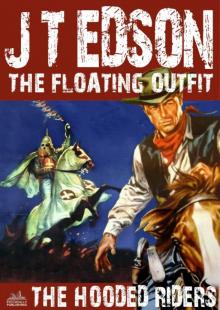 The Floating Outfit 9
The Floating Outfit 9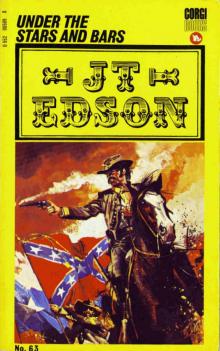 Under the Stars and Bars
Under the Stars and Bars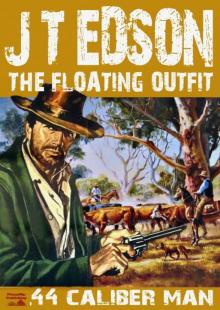 .44 Caliber Man
.44 Caliber Man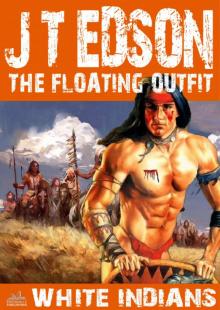 The Floating Outfit 17
The Floating Outfit 17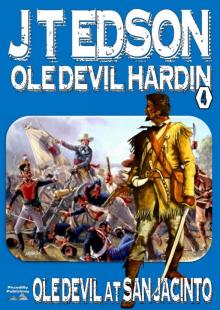 Ole Devil at San Jacinto (Old Devil Hardin Western Book 4)
Ole Devil at San Jacinto (Old Devil Hardin Western Book 4)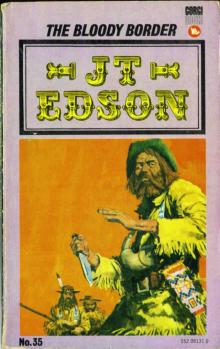 The Bloody Border
The Bloody Border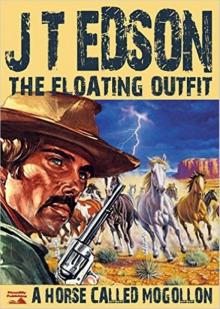 A Horse Called Mogollon (Floating Outfit Book 3)
A Horse Called Mogollon (Floating Outfit Book 3)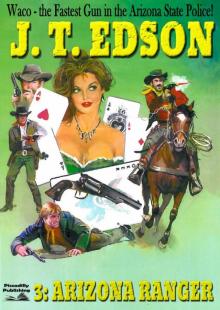 Waco 3
Waco 3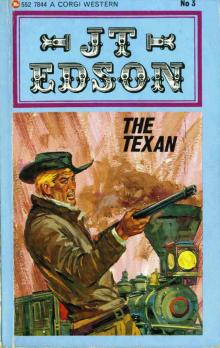 The Texan
The Texan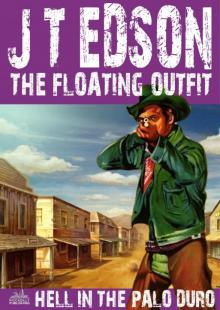 The Floating Outfit 35
The Floating Outfit 35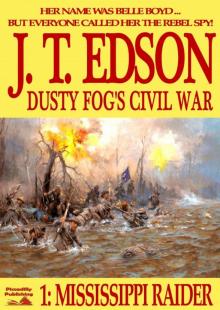 Mississippi Raider
Mississippi Raider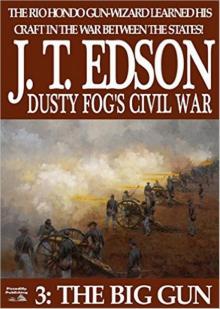 The Big Gun (Dusty Fog's Civil War Book 3)
The Big Gun (Dusty Fog's Civil War Book 3)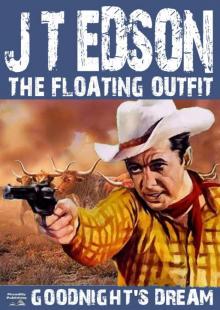 Goodnight's Dream (A Floating Outfit Western Book 4)
Goodnight's Dream (A Floating Outfit Western Book 4) Waco 4
Waco 4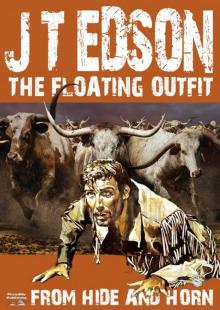 From Hide and Horn (A Floating Outfit Book Number 5)
From Hide and Horn (A Floating Outfit Book Number 5)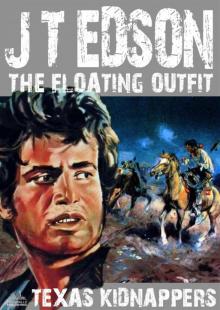 The Floating Outfit 18
The Floating Outfit 18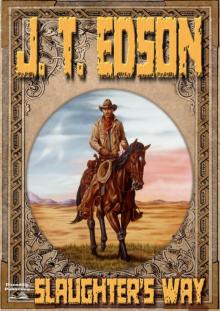 Slaughter's Way (A J.T. Edson Western)
Slaughter's Way (A J.T. Edson Western)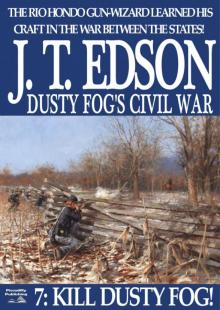 Dusty Fog's Civil War 7
Dusty Fog's Civil War 7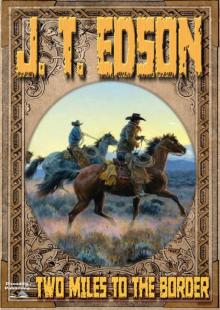 Two Miles to the Border (A J.T. Edson Western)
Two Miles to the Border (A J.T. Edson Western)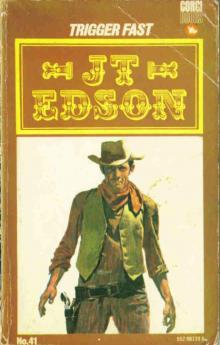 Trigger Fast
Trigger Fast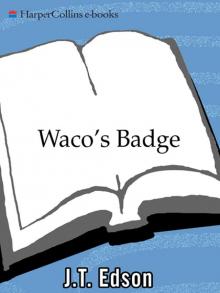 Waco's Badge
Waco's Badge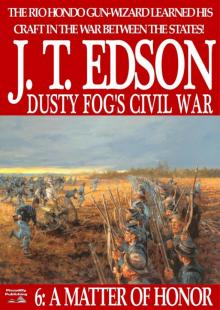 A Matter of Honor (Dusty Fog Civil War Book 6)
A Matter of Honor (Dusty Fog Civil War Book 6)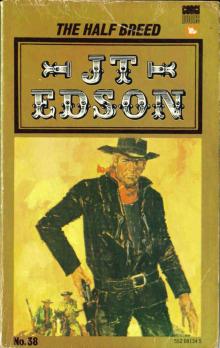 The Half Breed
The Half Breed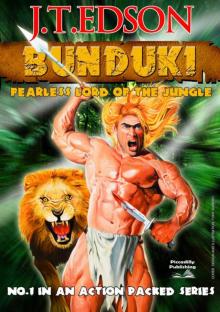 Bunduki (Bunduki Series Book One)
Bunduki (Bunduki Series Book One)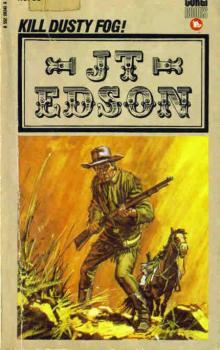 Kill Dusty Fog
Kill Dusty Fog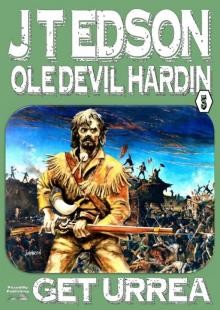 Get Urrea! (An Ole Devil Hardin Western Book 5)
Get Urrea! (An Ole Devil Hardin Western Book 5)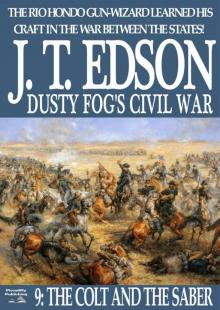 Dusty Fog's Civil War 9
Dusty Fog's Civil War 9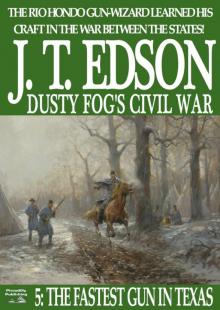 The Fastest Gun in Texas (A Dusty Fog Civil War Book 5)
The Fastest Gun in Texas (A Dusty Fog Civil War Book 5)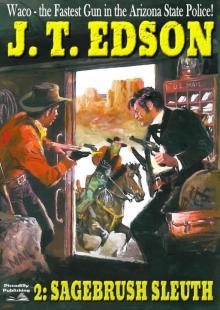 Sagebrush Sleuth (A Waco Western #2)
Sagebrush Sleuth (A Waco Western #2)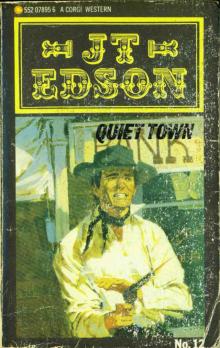 Quiet Town
Quiet Town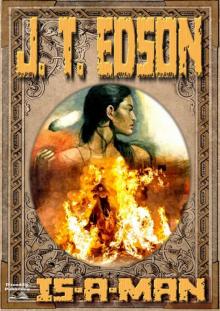 Is-A-Man (A J.T. Edson Standalone Western)
Is-A-Man (A J.T. Edson Standalone Western)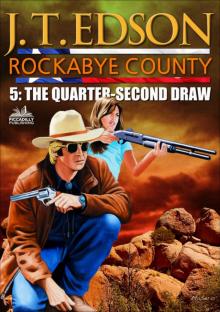 Rockabye County 5
Rockabye County 5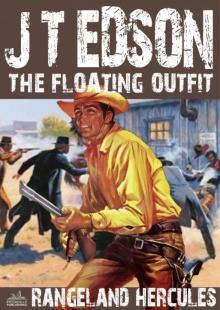 The Floating Outfit 14
The Floating Outfit 14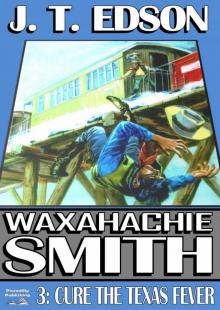 Cure the Texas Fever (A Waxahachie Smith Western--Book 3)
Cure the Texas Fever (A Waxahachie Smith Western--Book 3)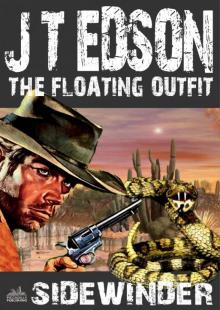 The Floating Outfit 13
The Floating Outfit 13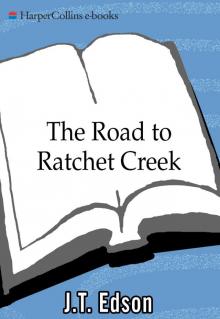 The Road to Ratchet Creek
The Road to Ratchet Creek